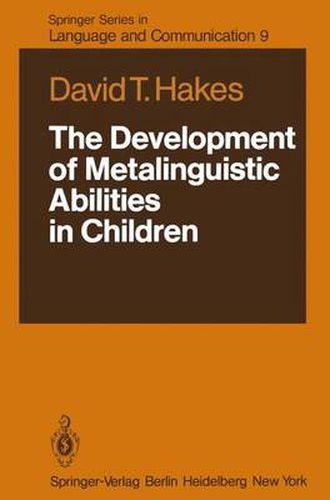Readings Newsletter
Become a Readings Member to make your shopping experience even easier.
Sign in or sign up for free!
You’re not far away from qualifying for FREE standard shipping within Australia
You’ve qualified for FREE standard shipping within Australia
The cart is loading…






This title is printed to order. This book may have been self-published. If so, we cannot guarantee the quality of the content. In the main most books will have gone through the editing process however some may not. We therefore suggest that you be aware of this before ordering this book. If in doubt check either the author or publisher’s details as we are unable to accept any returns unless they are faulty. Please contact us if you have any questions.
Not very many years ago, it was common for language researchers and theorists to argue that language development was somehow special and separate from other aspects of development. It was a period when the 1 ittle 1 inguist view of language development was common, and much discussion was devoted to develop mental linguistic universals, in contrast to more broadly defined cognitive universals. It seemed to me at the time (and still does) that such views reflected more their promulgators’ ignorance of those aspects of cognitive development most likely to provide illuminating parallels with language development than they did the true developmental state of affairs. Coming from a neo-Piagetian frame of reference, it seemed to me that there were striking parallels be tween the development of children’s language comprehension abilities and the cognitive developmental changes occurring contemporaneously, largely during the period Piaget characterized as the preoperational stage. And, though more difficult to see even now, there appeared also to be developmentally earlier parallels during the sensory-motor stage.
$9.00 standard shipping within Australia
FREE standard shipping within Australia for orders over $100.00
Express & International shipping calculated at checkout
This title is printed to order. This book may have been self-published. If so, we cannot guarantee the quality of the content. In the main most books will have gone through the editing process however some may not. We therefore suggest that you be aware of this before ordering this book. If in doubt check either the author or publisher’s details as we are unable to accept any returns unless they are faulty. Please contact us if you have any questions.
Not very many years ago, it was common for language researchers and theorists to argue that language development was somehow special and separate from other aspects of development. It was a period when the 1 ittle 1 inguist view of language development was common, and much discussion was devoted to develop mental linguistic universals, in contrast to more broadly defined cognitive universals. It seemed to me at the time (and still does) that such views reflected more their promulgators’ ignorance of those aspects of cognitive development most likely to provide illuminating parallels with language development than they did the true developmental state of affairs. Coming from a neo-Piagetian frame of reference, it seemed to me that there were striking parallels be tween the development of children’s language comprehension abilities and the cognitive developmental changes occurring contemporaneously, largely during the period Piaget characterized as the preoperational stage. And, though more difficult to see even now, there appeared also to be developmentally earlier parallels during the sensory-motor stage.